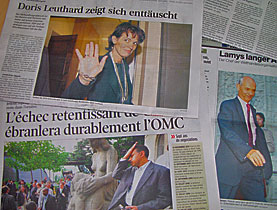Swiss press berate WTO failure

Wednesday's newspapers in Switzerland did not mince their words on the failure of world trade liberalisation talks in Geneva; there was little understanding.
Headlines ranged from “Everyone loses, no one wins” to “Fiasco” and “Infernal machine”.
The Geneva newspaper Le Temps described the failure of the Doha Round under the auspices of the World Trade Organization as a “tragedy”.
“In the short term, this failure will give comfort to those who felt themselves the most threatened, with the farmers leading the way. But… it’s the world economy which is the loser.”
“It doesn’t have any need for such a bad signal at a time when recession is knocking at the door of many countries.”
The paper went on to describe the result of the nine-day talks as an “own goal” and commented the failure would strengthen a trend towards protectionism.
The Basler Zeitung of Basel said ministers taking part in the longest session of talks in the WTO’s history could not agree on decisions for the common good.
“Senseless high hurdles”
“Industrial countries will continue to have to overcome senseless high hurdles to export their products to developing and emerging countries,” it commented.
“On the other side of the coin, developing countries still will not have the opportunity to bring their agricultural products on to the world market because the target countries are subsidising their own agriculture with billions from their state coffers.”
It also felt that the chances of the talks being successful at a later date were “minimal”.
This theme was also picked up by a number of other papers. For example, the respected Neue Zürcher Zeitung described future chances of success of the Doha Round as “practically zero”.
It explained that in the United States, President George Bush’s successor had to familiarise himself with the issue and elections were also taking part inside the European Union.
“Protectionism”
“Worldwide protectionism that is flaring up will not be put in its [proper] place,” it added.
The Tribune de Genève makes the point that at a time when the world is facing a food crisis, every country had wanted to guarantee that its citizens had access to vital resources.
“The United States, among others, swears by the opening up of markets. But India, for example, wants to be in a position to protect its agriculture in case of emergency.
“The problem with the failure of the Doha Round is that it deals a blow to multilateralism.”
On that note, several papers feel that countries will now intensify their efforts at making bilateral accords around the globe.
Short sightedness
Not surprisingly perhaps, the Swiss press is not shy at criticising what it considers the short sightedness of Swiss farmers, who on Tuesday expressed relief at the failure of the Geneva talks.
“But relief is out of place. Swiss agriculture cannot avoid having to sink its protectionist tariffs in the future… as a result, reform of Swiss agriculture policy must continue,” the Berner Zeitung said.
And the Bund newspaper of Bern commented that the farmers had to realise that the wellbeing depended on the good development of the economy as a whole.
“Industry and the services sector would have been able to take advantage of a successful completion [of the talks] in Geneva.”
swissinfo, Robert Brookes
Launched in the Qatari capital in November 2001, the WTO’s latest liberalisation talks known as the Doha Round have struggled to overcome many countries’ fears of exposing sensitive agricultural and manufacturing industries to more competition.
The negotiations broke down in July 2006, well past the original deadline of January 2005.
Despite, the key elements for an overall deal are now relatively clear. The United States would cut its farm subsidies, blamed by poor countries for squeezing their farmers out of the market.
The European Union would open its protected market for food by cutting agricultural tariffs, giving developing country food exporters such as Brazil new opportunities.
And developing countries would cut their industrial tariffs, opening their markets to manufacturers in rich countries. Other elements would include a boost to trade among developing nations and liberalization of services such as banking and telecoms.
But developing countries want waivers to tariff cuts to protect their subsistence farmers and fledgling industries, while rich nations say they cannot sell the sacrifices being asked of them unless they can point to gains in market access elsewhere.

In compliance with the JTI standards
More: SWI swissinfo.ch certified by the Journalism Trust Initiative










You can find an overview of ongoing debates with our journalists here . Please join us!
If you want to start a conversation about a topic raised in this article or want to report factual errors, email us at english@swissinfo.ch.